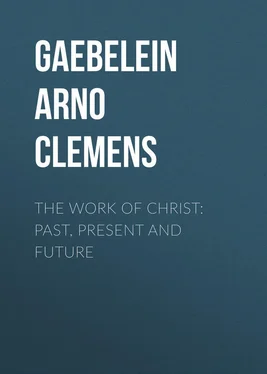Arno Gaebelein - The Work Of Christ - Past, Present and Future
Здесь есть возможность читать онлайн «Arno Gaebelein - The Work Of Christ - Past, Present and Future» — ознакомительный отрывок электронной книги совершенно бесплатно, а после прочтения отрывка купить полную версию. В некоторых случаях можно слушать аудио, скачать через торрент в формате fb2 и присутствует краткое содержание. Жанр: foreign_religion, foreign_antique, foreign_prose, на английском языке. Описание произведения, (предисловие) а так же отзывы посетителей доступны на портале библиотеки ЛибКат.
- Название:The Work Of Christ: Past, Present and Future
- Автор:
- Жанр:
- Год:неизвестен
- ISBN:нет данных
- Рейтинг книги:4 / 5. Голосов: 1
-
Избранное:Добавить в избранное
- Отзывы:
-
Ваша оценка:
- 80
- 1
- 2
- 3
- 4
- 5
The Work Of Christ: Past, Present and Future: краткое содержание, описание и аннотация
Предлагаем к чтению аннотацию, описание, краткое содержание или предисловие (зависит от того, что написал сам автор книги «The Work Of Christ: Past, Present and Future»). Если вы не нашли необходимую информацию о книге — напишите в комментариях, мы постараемся отыскать её.
The Work Of Christ: Past, Present and Future — читать онлайн ознакомительный отрывок
Ниже представлен текст книги, разбитый по страницам. Система сохранения места последней прочитанной страницы, позволяет с удобством читать онлайн бесплатно книгу «The Work Of Christ: Past, Present and Future», без необходимости каждый раз заново искать на чём Вы остановились. Поставьте закладку, и сможете в любой момент перейти на страницу, на которой закончили чтение.
Интервал:
Закладка:
It is a comfort to believers in these evil days to remember, that such a rejection of the doctrine of Christ, His Person and His work, is predicted in the Bible to take place immediately before the Lord comes. The end of the age is upon us. These denials will not decrease, but become more numerous.
The Purpose of the Incarnation
And what was the purpose of the incarnation? By incarnation the invisible God was made known to man. The Lord Jesus Christ is the image of the invisible God. No man hath seen God at any time, the only Begotten, who is in the bosom of the Father, hath declared Him. As One with the Father, the Lord Jesus Christ could say, “Whosoever seeth Me, seeth the Father.”
The attributes of God were made known by Him in incarnation. We behold the holiness of God in that holy life, which was lived on earth to glorify the Father. He manifested omniscience. He knew what was in men and knew their thoughts. He manifested the power of God in controlling the forces of nature, commanding the wind and the waves, turning water into wine. He had power over disease, over the demons and over death. He revealed the Love and the compassion of God.
By incarnation the Son of God brought likewise the Word of God to man. “God who at sundry times and in divers manners spake in time past unto the Fathers by the Prophets, hath in these last days spoken unto us by His Son” (Hebrews i:1). He confirmed the Law and the Prophets, therefore all criticism of the Old Testament attacks the authority and infallibility of the Son of God. He also revealed the will of God, made known the Father and the fact of eternal life, and the eternal and conscious punishment of the wicked. He predicted the great future events concerning Himself and His Kingdom, the end of the age and His visible Return.
The incarnation was necessary in anticipation of His work as the Priest of His people. He was to be after His death on the cross and after resurrection, the merciful and faithful High Priest. Such He is now. He took part of flesh and blood, we read in the second chapter of Hebrews, that He might be a merciful and faithful High Priest. He was tempted in all things as we are, with the exception of sin. He suffered in being tempted so that He might be touched with the feeling of our infirmities and succour them that are tempted. And all He was to be and is now, the Second Man, the last Adam, the head of the church, the head of the new creation, all and much else necessitated His incarnation.
What Incarnation could not Accomplish
However, the great purpose of the incarnation of the Son of God was His work of redemption. For this great purpose He came into the world. He came that, after a life, which completely glorified the Father and upheld His holy law and vindicated God’s rights as the lawgiver, He might accomplish the great work of atonement. John stated this great work the Son of God came to do in a brief sentence, “Behold the Lamb of God, which taketh away the sin of the world.” Sin, that accursed thing, had to be taken out of the way. Propitiation for sins had to be made. A sacrifice had to be brought which would glorify a holy God and satisfy, as well as exalt, His righteousness. Peace had to be made. The sins of many had to be paid and the full penalty of them to be borne.
Incarnation in itself, the marvelous and ever blessed humiliation of the Son of God by taking on the human form, His holy blessed life, His loving words, words of life and peace, yea, all He did in deeds of love and compassion could never accomplish this. Incarnation brought God to Man, but could never bring man back to a holy God. Incarnation could not make an end of sin, nor make it possible for a righteous God to show mercy to the fallen and the lost, in a righteous way. This great work of redemption could only be accomplished by His death on the cross. For this He had come. He came to put away sin by the sacrifice of Himself. The Author and Prince of Life came that He might give His Life a ransom for many. The good Shepherd appeared to give His life for the sheep. By His death alone, the great work of redemption could be accomplished.
III.
His work on the Cross and What has been Accomplished by It
And now let us consider His work on the cross and what has been accomplished by it. But who is able to speak worthily of this theme of all themes? Who can fathom the solemn yet blessed fact, the death of the Son of God on the cross? What tongue or pen can describe the sad, yet glorious truth, that the Just One died for the unjust, that Christ died for the ungodly! He who knew no sin was made sin for us! And what human mind can estimate the wonderful results of His work on the cross!
Some Christians speak as if the death on the cross, the work accomplished there, is so fully known to them, that they do not need any more instruction on it. They tell us that they search for deeper things. There can be nothing deeper than the death of God’s Son on the cross. Depths are here which are unfathomable. We must ever turn back to the cross. Always we shall learn something new. With unspeakable Glory upon us and greater glory before us in eternal ages to come, the cross of Christ and the Lamb of God which has taken away the sin of the world can never be forgotten. But we shall never know what that death on the cross meant for Him and what it meant to God.
Made Sin for Us
In Hebrews x we read of the sacrifices which were offered by the Jews year after year. These sacrifices could not take away sin. Then He, the Son of God, stepped forward and made His great declaration. Coming into the world He saith, “Sacrifice and offering Thou wouldest not, but a body hast Thou prepared me. In burnt offerings and sacrifices for sins Thou hadst no pleasure” (verses 4-5). The body prepared puts before us again the fact of incarnation. That body was a prepared body, a holy body, an undefiled body, a body in which sin could not dwell and on which death had no claim. But when He took on that body, He likewise said: “Lo? come to do Thy will, O God.” In the tenth verse we read, “By the which will (the will of God, which dates back before the foundation of the world), we are sanctified through the offering of the body of Jesus Christ once for all.” Through the eternal Spirit He offered Himself without spot to God. The holy Lamb of God, with no spot or blemish upon Him, shed His precious blood on the cross, to procure redemption. But what it all meant for Him who was as truly Man as He is God! Here was a Being perfectly holy, One who had always pleased God and did His will, yea, His meat and drink was to do the will of Him that sent Him. Sin was the horrible defiling thing to Him. He, too, like the holy God, hated and hates sin. And yet such a One was made sin for us. He had to stand in the place of guilty sinners and all the waves and billowy of divine judgment and wrath had to pass over Him. He drank the cup of wrath to the last drop. He suffered in a fourfold way.
1. In Himself.Before He ever approached the garden of Gethsemane, He was troubled in His spirit. We hear Him say, “Now my soul is troubled – Father, save me from this hour, but for this cause came I to this hour.” He looked on towards the cross. And why that agony in the garden? Why was His sweat as it were great drops of blood? Why the repeated prayer, “Father, if it is possible, let this cup pass from me?” How many dishonoring explanations have been written of the Gethsemane suffering, as if He was afraid to die or that the devil tried to kill Him there to prevent his death on the cross, and that He feared the devil. But what was it? He suffered in Himself. His holy soul shrank from that which a holy God must hate, that which He hated – SIN. He was about to be made sin and He knew no sin. What suffering this produced in the Holy One of God to take all upon Himself and to stand in the sinner’s place before a holy sin-hating God, our poor finite minds cannot realize.
Читать дальшеИнтервал:
Закладка:
Похожие книги на «The Work Of Christ: Past, Present and Future»
Представляем Вашему вниманию похожие книги на «The Work Of Christ: Past, Present and Future» списком для выбора. Мы отобрали схожую по названию и смыслу литературу в надежде предоставить читателям больше вариантов отыскать новые, интересные, ещё непрочитанные произведения.
Обсуждение, отзывы о книге «The Work Of Christ: Past, Present and Future» и просто собственные мнения читателей. Оставьте ваши комментарии, напишите, что Вы думаете о произведении, его смысле или главных героях. Укажите что конкретно понравилось, а что нет, и почему Вы так считаете.












